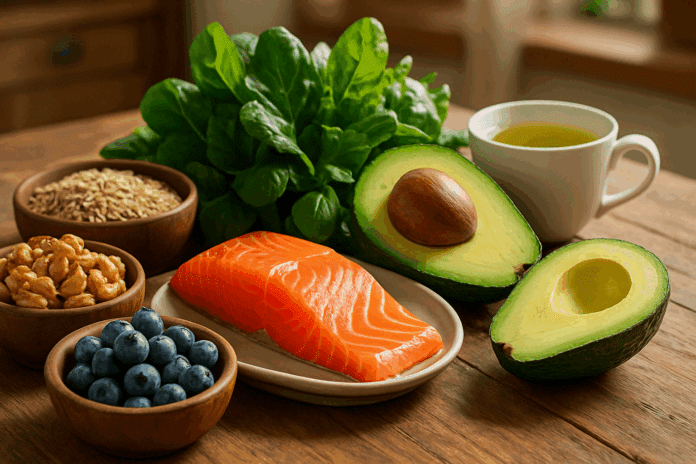Introduction: How Nutrition Shapes the Mind and Memory
When it comes to boosting memory, what you eat plays a far more significant role than many realize. The brain, being a metabolically active organ, thrives on a diet rich in the right nutrients. These nutrients support neuroplasticity, reduce inflammation, enhance neurotransmitter production, and improve overall cognitive function. Far from being an isolated entity, the brain is intricately connected to the choices we make at mealtimes. Including memory-boosting foods in your diet can lead to improved focus, sharper recall, and long-term mental well-being. Understanding the power of food is no longer just a curiosity but an essential step in unlocking the brain’s full potential.
Diet affects everything from the speed at which you process information to the resilience of your memory as you age. Brain boosting foods contain specific nutrients that fuel neurons, protect against oxidative damage, and enhance synaptic plasticity—the mechanism through which learning and memory occur. For example, foods that help with memory often include omega-3 fatty acids, flavonoids, B vitamins, and amino acids like tryptophan and tyrosine, all of which contribute to neurotransmitter production and regulation. When you’re wondering how to get better memory, the answer is often found in the consistent inclusion of these brain-supportive nutrients.
Equally important is the relationship between inflammation and cognitive performance. Diets high in processed foods and added sugars can promote systemic inflammation that reaches the brain, impairing memory and mood. Conversely, anti-inflammatory foods—such as leafy greens, berries, fatty fish, and nuts—not only support physical health but also enhance mental clarity and emotional stability. Understanding how to improve memory and concentration begins with the realization that food is both fuel and medicine for the brain.
You may also like: Boost Brain Power Naturally: Evidence-Based Cognitive Training Activities and Memory Exercises That Support Long-Term Mental Health
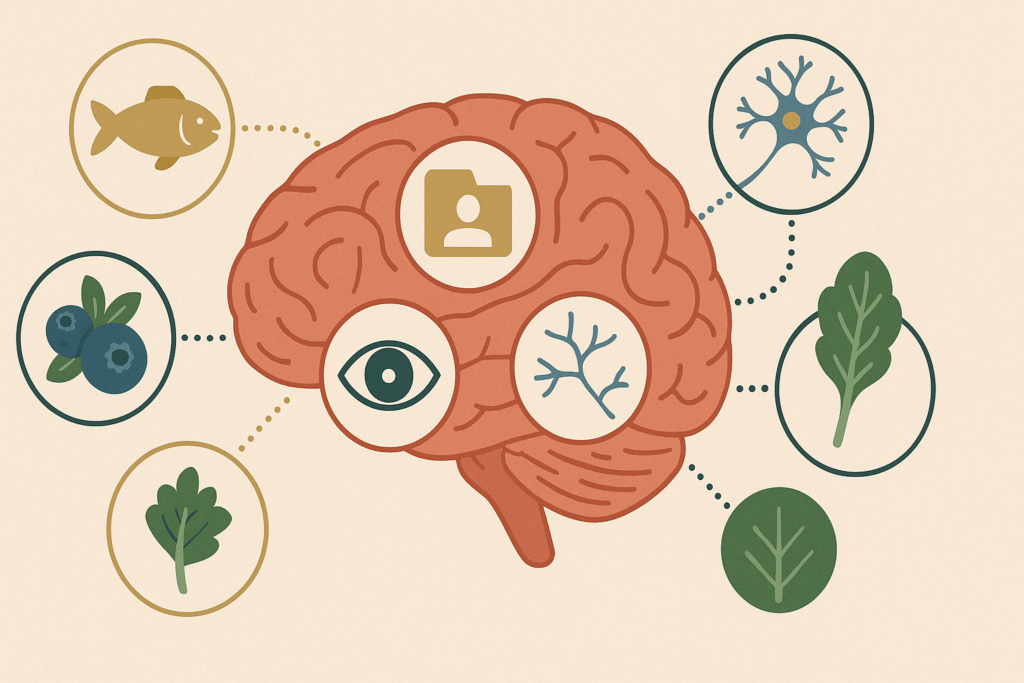
The Science Behind Brain Foods: Why Diet Affects Memory
To understand how to gain memory through food, it helps to start with the science. The brain is composed of nearly 60% fat, and it consumes about 20% of the body’s total energy. It thrives on glucose, amino acids, and fatty acids to maintain neural communication and plasticity. Foods rich in antioxidants, omega-3 fatty acids, and B vitamins are known to support the brain’s ability to form, store, and retrieve memories. When researchers ask how to improve memory recall, they often point to diets that reduce oxidative stress and support synaptic integrity, such as the Mediterranean or MIND diets.
Brain boosting foods don’t work in isolation; they act as part of a complex biochemical symphony. The right balance of micronutrients helps regulate neurotransmitters like dopamine, serotonin, and acetylcholine—key players in attention, mood, and memory. Chronic deficiencies in essential nutrients like vitamin B12, folate, and omega-3s have been linked to cognitive decline, while a surplus of sugar and trans fats is associated with poor memory performance. Understanding this connection allows us to explore not just what food is good for brain function, but how consistent, quality nourishment becomes one of the best ways to improve memory.
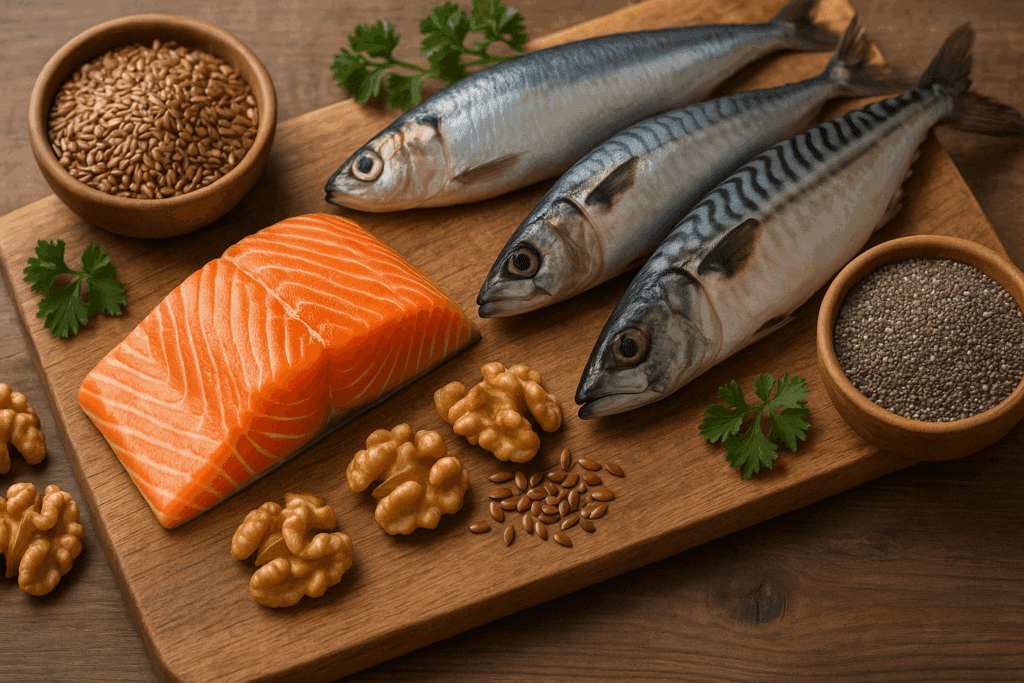
Omega-3 Fatty Acids: Essential Fuel for Focus and Mental Clarity
Omega-3 fatty acids are among the most well-researched brain nutrients, and for good reason. Found in abundance in fatty fish like salmon, mackerel, and sardines, omega-3s play a vital role in building cell membranes in the brain. They are particularly rich in docosahexaenoic acid (DHA), a structural fat that supports neuron growth, signaling, and plasticity. These fatty acids have been shown to enhance cognitive performance, reduce age-related memory loss, and even improve symptoms of mood disorders.
Foods that help with memory often contain omega-3s because these fats are anti-inflammatory and neuroprotective. Regular intake of DHA and eicosapentaenoic acid (EPA) has been linked with improved executive function, working memory, and attention span. This makes omega-3s particularly relevant for those looking into how to improve memory and concentration. For vegetarians or those who don’t consume fish, plant-based sources like chia seeds, flaxseeds, and walnuts offer alpha-linolenic acid (ALA), which the body can convert to DHA and EPA, albeit inefficiently.
What sets omega-3 fatty acids apart is their role in maintaining fluidity within neuronal membranes. This flexibility enables efficient communication between brain cells, a fundamental process underlying memory formation and cognitive agility. Deficiencies in omega-3s have been associated with mood instability, cognitive decline, and even structural brain shrinkage in key areas related to memory. When evaluating foods good for the brain, few rival the multifaceted benefits of omega-3-rich sources.
Clinical studies further support their cognitive benefits, particularly in aging populations. Supplementation with fish oil has demonstrated improvements in verbal memory, processing speed, and working memory in individuals with mild cognitive impairment. As more research emerges, omega-3s are increasingly recognized not just as nutrients but as powerful therapeutic agents in maintaining mental acuity and preventing neurodegeneration. Incorporating these healthy fats regularly may be one of the most effective dietary strategies for those seeking how to get good memory and preserve long-term brain function.
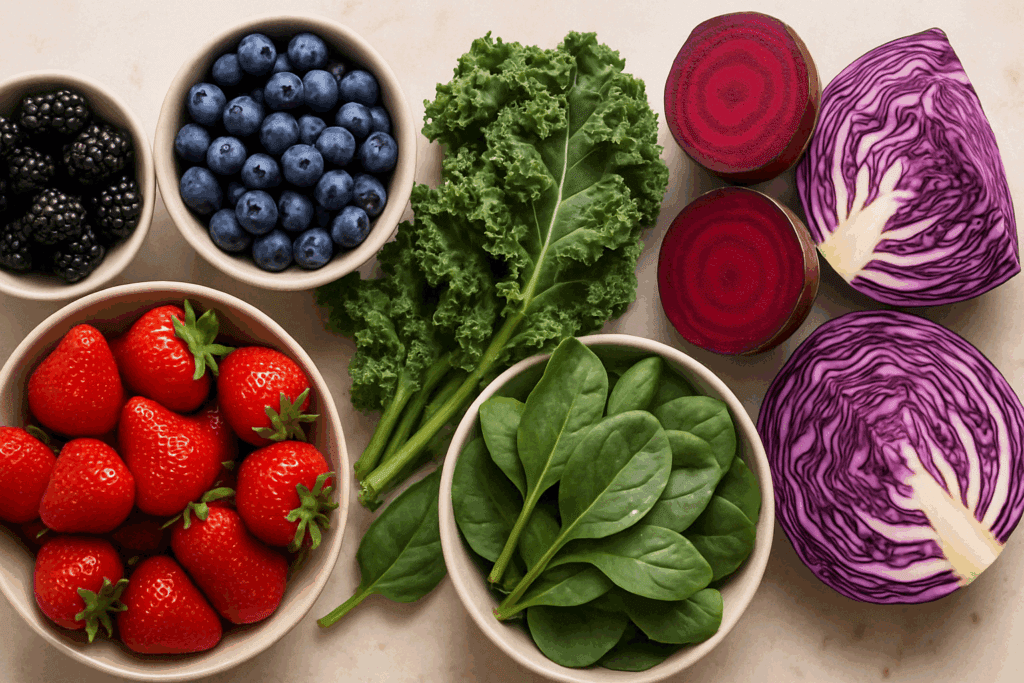
Antioxidant-Rich Foods: Combatting Oxidative Stress in the Brain
Oxidative stress is a major contributor to cognitive aging and neurodegeneration. Free radicals generated through metabolism or environmental exposure can damage brain cells if not neutralized. This is where antioxidants become crucial. Berries—especially blueberries, strawberries, and blackberries—are some of the best foods for brain health due to their high flavonoid content. These natural compounds improve memory by enhancing neuronal signaling, reducing inflammation, and increasing blood flow to the brain.
Studies have shown that regular consumption of berries may delay brain aging by up to 2.5 years. Beyond berries, dark leafy greens like kale and spinach, as well as richly colored vegetables like beets and red cabbage, are also strong contenders on any brain foods list. These antioxidant-rich options are particularly beneficial when exploring how to strengthen memory and how to help memory loss, especially in older adults.
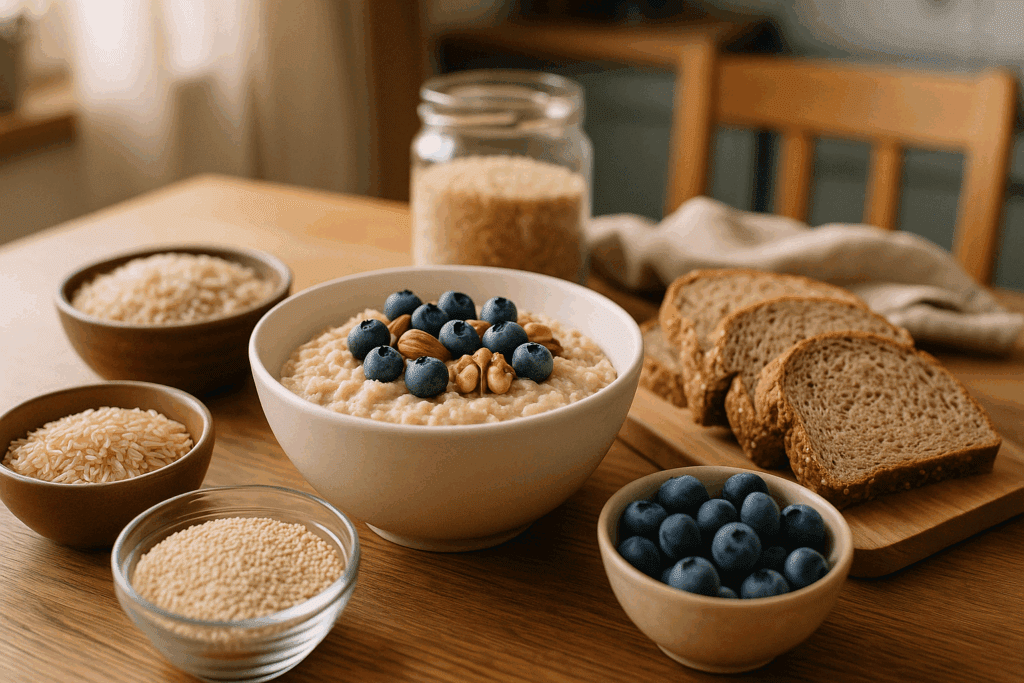
Whole Grains and Complex Carbohydrates: Sustained Energy for Mental Performance
Carbohydrates are often demonized in diet culture, but when it comes to food for brain health, not all carbs are created equal. The brain requires a steady supply of glucose to function, and complex carbohydrates—like those found in oats, brown rice, quinoa, and whole-grain cereals—release energy slowly, maintaining cognitive function throughout the day. The best cereals for memory are those high in fiber, low in added sugars, and enriched with B vitamins.
These whole grains help regulate blood sugar, which prevents mental fog, irritability, and fatigue. They also promote the production of acetylcholine, a neurotransmitter essential for learning and memory. Including these carbohydrates in your diet is one of the simplest ways to improve memory, especially for students, professionals, or anyone needing sustained mental endurance. In fact, choosing foods good for the brain like whole-grain bread with avocado or oatmeal with blueberries can create a synergistic effect, combining slow-burning energy with brain-nourishing antioxidants.
Vitamin-Rich Vegetables: B Vitamins, Folate, and Brain Longevity
The family of B vitamins, including B6, B9 (folate), and B12, plays a foundational role in maintaining brain health. These nutrients are involved in homocysteine regulation, neurotransmitter synthesis, and DNA repair. Deficiencies in these vitamins have been correlated with memory loss, depression, and cognitive decline. Leafy greens, legumes, asparagus, and cruciferous vegetables like broccoli and Brussels sprouts are potent sources of folate, while eggs, dairy, and poultry provide B12 and B6.
When assessing foods that improve memory, vitamin-rich vegetables often top the list because they help reduce inflammation and support neuron function. Regular consumption of these vegetables has been associated with greater brain volume and better memory performance over time. Learning how to strengthen short term memory through dietary means starts with optimizing B vitamin intake, making these vegetables indispensable for long-term cognitive resilience.
Beyond their individual contributions, B vitamins work synergistically to optimize neurological function. For example, B6 is crucial for converting amino acids into neurotransmitters like serotonin and dopamine, which affect mood and memory. Folate supports methylation processes essential for gene expression and detoxification, both of which influence cognitive clarity. B12, on the other hand, is vital for maintaining the protective myelin sheath around nerve cells—a deficiency in this vitamin can result in memory deficits and impaired motor function.
The importance of these nutrients becomes even more pronounced with age, as the body’s ability to absorb B12 from food naturally declines. This is why supplementation or fortified foods may be necessary for older adults or individuals with digestive issues. Foods that help with memory are not limited to exotic superfoods; often, the most powerful solutions are found in everyday produce like spinach, kale, and Brussels sprouts. Including a colorful variety of these vegetables in your meals supports how to improve short term memory and adds critical diversity to your brain foods list.
Moreover, these vitamin-rich vegetables often come packaged with additional brain-boosting compounds such as lutein and beta-carotene, which offer antioxidant protection to brain tissues. When paired with healthy fats—like olive oil or avocado—these nutrients become even more bioavailable, enhancing their effectiveness in improving memory recall and concentration. In a world increasingly focused on fast fixes and nootropic supplements, the long-proven impact of whole vegetables on cognitive longevity remains an invaluable and accessible strategy for anyone committed to understanding how to gain memory through nutritional excellence.
Nuts and Seeds: Small Foods with Big Brain Benefits
Though small in size, nuts and seeds pack a powerful nutritional punch. They are rich in healthy fats, antioxidants, protein, and trace minerals like magnesium and zinc—all of which are critical for optimal brain function. Walnuts, for example, are uniquely high in DHA and have been shown to support memory and learning in both animal and human studies. Almonds offer vitamin E, which protects brain cells from oxidative damage, while pumpkin seeds provide zinc, a mineral linked to memory enhancement.
Adding a handful of these brain boosting foods to your daily routine is an easy, sustainable way to get better memory naturally. Whether sprinkled over salads or eaten as a snack, nuts and seeds offer convenient and versatile options that contribute to overall food for brain health. They also support the balance of neurotransmitters and hormones that regulate attention and emotional well-being, providing a holistic approach to how to improve memory and concentration without pharmaceutical intervention.
Hydration and Brain Function: The Forgotten Nutrient in Cognitive Performance
While we often focus on solid food, hydration plays an equally critical role in mental clarity and memory. The brain is about 75% water, and even mild dehydration can impair attention, processing speed, and short-term memory. Water is essential for nutrient transport, waste removal, and temperature regulation within the brain. Thus, maintaining proper hydration is one of the simplest ways to improve memory recall and stay cognitively sharp throughout the day.
Beyond plain water, certain beverages can also contribute to brain health. Green tea contains caffeine and L-theanine, a combination shown to improve alertness and working memory. Beet juice, rich in nitrates, may enhance blood flow to the brain, making it a useful drink for improving mental function. When exploring what drinks help with memory loss, it’s important to prioritize those that hydrate while offering neuroprotective compounds. Avoiding sugary drinks and opting for herbal teas, infused water, or antioxidant-rich beverages can support better brain function and enhance the effects of memory-supportive foods.
Chronic dehydration is surprisingly common and often overlooked, especially among older adults who may lose the sensation of thirst with age. This puts them at increased risk of cognitive decline related to fluid imbalance. For those researching how to gain memory naturally, making hydration a core part of their wellness routine is an essential step. Electrolyte-rich fluids, especially after physical activity, can further enhance mental performance by optimizing cellular communication in the brain.
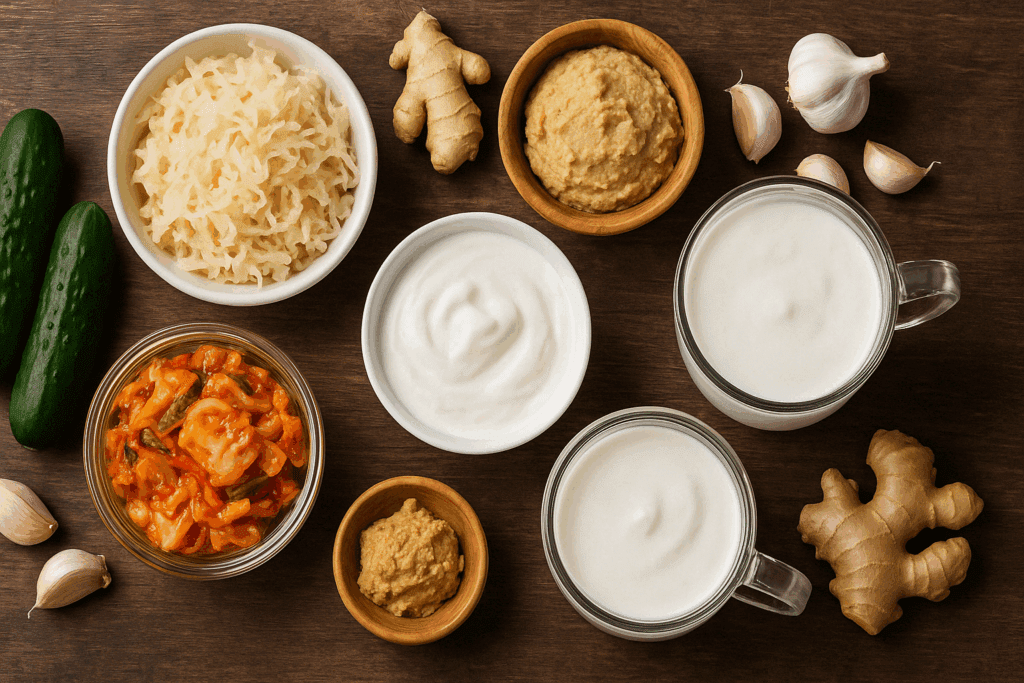
Fermented Foods and the Gut-Brain Connection: Memory Starts in the Microbiome
Emerging research on the gut-brain axis has revealed profound connections between digestive health and cognitive function. The gut microbiome, a dynamic ecosystem of bacteria and other microorganisms, plays a key role in producing neurotransmitters, regulating inflammation, and maintaining the integrity of the blood-brain barrier. Disruptions in gut flora have been linked to poor memory, mood disorders, and even neurodegenerative diseases. Incorporating fermented foods like yogurt, kefir, kimchi, sauerkraut, and miso can help restore balance to the gut microbiota and support mental clarity.
These fermented foods not only promote digestion but also contribute to the body’s ability to absorb critical brain nutrients such as B vitamins, magnesium, and omega-3 fatty acids. Many individuals wondering how to get good memory may overlook the gut as a starting point, but the evidence is mounting that a healthy digestive system is essential for optimal cognition. Foods that help with memory are increasingly being recognized as those that nourish the gut-brain axis—highlighting yet another reason to eat mindfully for mental health.
Furthermore, short-chain fatty acids (SCFAs) produced by healthy gut bacteria have been shown to protect brain cells and modulate inflammation in the central nervous system. This intricate connection explains why people exploring foods good for the brain must also consider the prebiotic fibers and fermented products that sustain microbial diversity. Gut health impacts everything from how to improve memory recall to how to strengthen short term memory—meaning the path to brain enhancement may start with what you feed your microbiome.
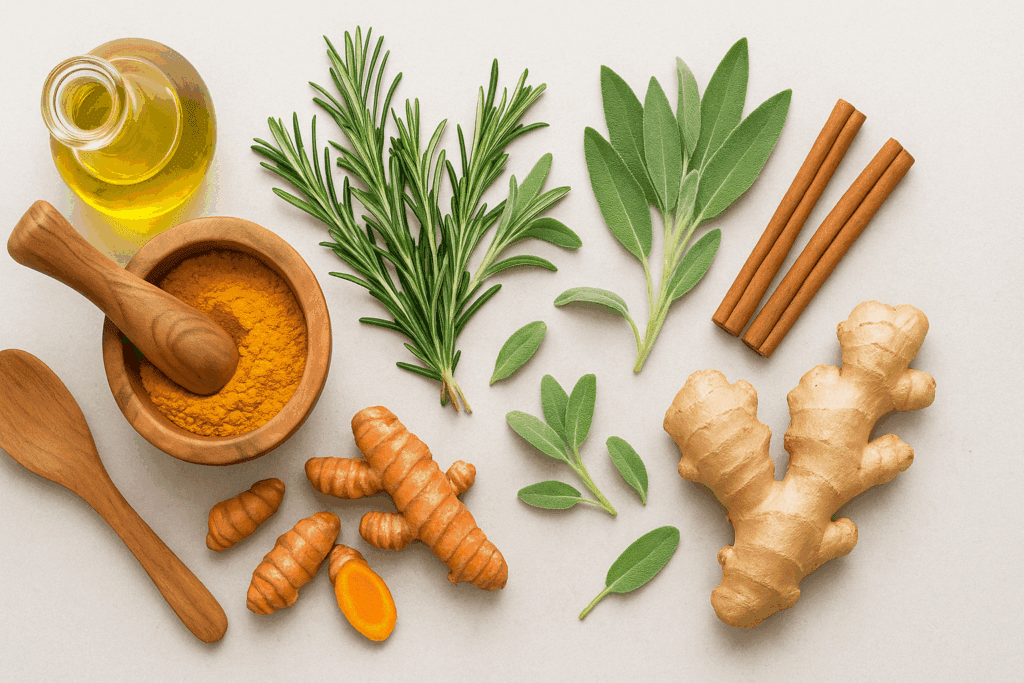
Spices and Herbs That Support Cognitive Health
While often used to flavor dishes, many spices and herbs possess potent neuroprotective properties that support brain health and memory. Turmeric, for example, contains curcumin, a compound known for its powerful anti-inflammatory and antioxidant effects. Curcumin has demonstrated the ability to cross the blood-brain barrier and may help reduce the accumulation of beta-amyloid plaques—a hallmark of Alzheimer’s disease. Incorporating turmeric into meals, especially when paired with black pepper to enhance absorption, is a simple dietary upgrade that may contribute to how to improve memory and concentration.
Another valuable spice is rosemary, long associated with improved recall. Studies suggest that even the aroma of rosemary may enhance memory performance, making it a compelling addition to both cooking and aromatherapy routines. Sage also deserves mention, as it has been shown to inhibit the breakdown of acetylcholine, a neurotransmitter crucial for learning and memory. These herbs and spices may seem minor in portion but can play a significant role in how to strengthen memory when used regularly.
Cinnamon, ginger, and ginkgo biloba round out the list of plant-based cognitive enhancers, each offering unique phytochemicals that influence blood circulation, neurogenesis, and synaptic activity. A diet that consistently includes a variety of spices not only enhances flavor but also integrates naturally into a lifestyle centered on foods to boost memory and overall brain resilience. These additions reflect an increasingly nuanced understanding of how everyday culinary choices affect cognitive well-being.
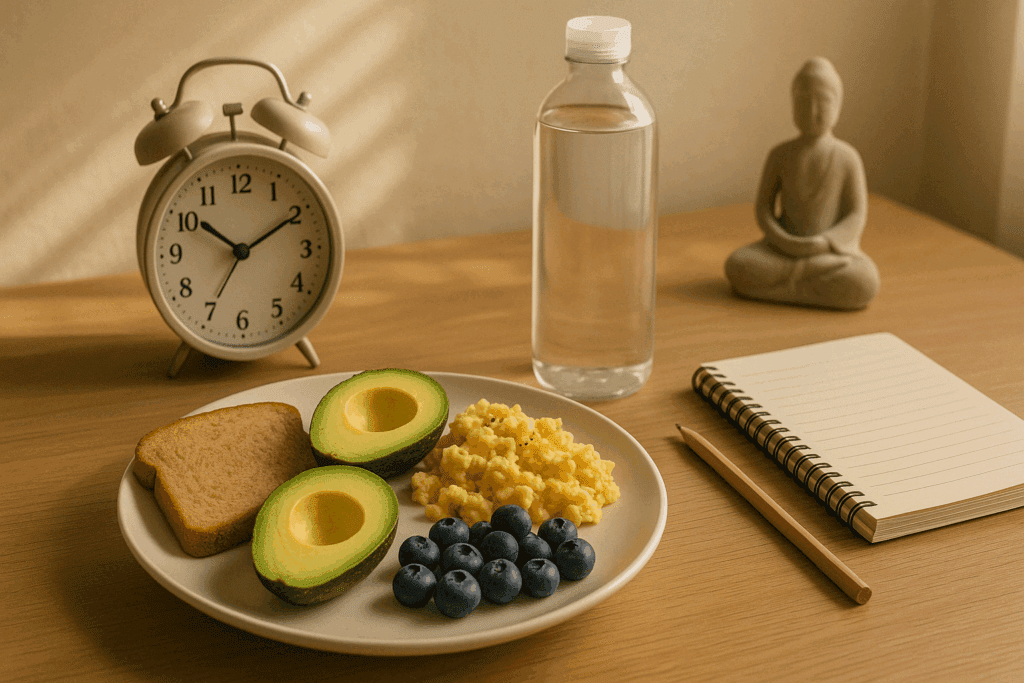
Timing, Consistency, and Lifestyle: Enhancing the Effects of Brain Foods
Knowing what to eat to boost memory is only part of the equation. When and how you eat also influences cognitive outcomes. Research supports the value of consistent eating patterns—such as regular meal timing and mindful eating practices—as a means of stabilizing blood glucose and sustaining focus throughout the day. Starting your morning with one of the best cereals for memory, rich in fiber and low in sugar, provides a reliable energy base for learning and mental performance.
Intermittent fasting, time-restricted eating, and avoiding late-night meals are also being studied for their potential to improve brain plasticity and metabolic health. These strategies may support how to increase memorization by enhancing autophagy and reducing insulin resistance, both of which are associated with neuroprotection. Incorporating exercise, sleep hygiene, and stress-reducing techniques like meditation can amplify the benefits of food for brain health.
Additionally, cognitive training programs and exposure to new learning opportunities—such as language acquisition or musical training—work synergistically with brain boosting foods. Together, these strategies help optimize how to get better memory and preserve mental agility across the lifespan. The combination of smart nutrition and lifestyle alignment may offer one of the most compelling answers to the question of how to help memory loss naturally and sustainably.
Crucially, timing your meals around your body’s natural circadian rhythm also plays a role in enhancing cognition. Studies suggest that eating earlier in the day, rather than consuming heavy meals late at night, supports better metabolic and cognitive outcomes. A nutrient-dense breakfast paired with hydration can prevent mid-morning brain fog, while a lighter dinner may support deeper sleep and better memory consolidation. The synergistic interplay of when you eat, how often you eat, and what you eat all contribute to improving short term memory and maintaining high levels of mental clarity.
Frequently Asked Questions: Brain Foods and Memory Enhancement
1. What are some underrated foods to boost memory that people often overlook?
While berries and fish dominate discussions around brain boosting foods, certain underappreciated options also offer powerful cognitive benefits. Seaweed, for instance, is rich in iodine—a nutrient essential for thyroid health and brain function. Lentils and chickpeas, packed with folate and magnesium, help regulate mood and enhance neural processing. Fermented foods like tempeh not only improve gut health but may also influence how to improve memory and concentration through the gut-brain axis. Additionally, herbs like basil and spices like saffron are emerging in research as potential memory modulators. Including these lesser-known foods for memory in your regular rotation can provide an edge in how to gain memory naturally and holistically.
2. How do lifestyle habits interact with foods that help with memory?
Good nutrition alone isn’t enough—how we live day to day profoundly influences how food affects brain performance. For example, combining foods that improve memory with quality sleep, exercise, and stress management magnifies their benefits. Omega-3s work better when paired with regular cardiovascular activity, and B-vitamin absorption improves when stress is controlled. Mindful eating and consistent meal timing also enhance metabolic efficiency, helping your body utilize the nutrients in brain improvement food more effectively. If you’re exploring how to improve short term memory or how to increase memorization, focus on both dietary choices and lifestyle rhythms that sustain cognitive vitality.
3. What are the best cereals for memory, and how do they differ from standard options?
When evaluating the best cereals for memory, the key lies in ingredients. Cereals fortified with B vitamins, omega-3s, and antioxidants stand out among food for brain health. Look for whole grain bases like oats or quinoa, paired with brain foods like flaxseed, walnuts, or dried blueberries. Avoid high-sugar options that cause glucose spikes and subsequent crashes in concentration. Instead, prioritize slow-digesting fiber and protein combinations that stabilize energy levels and promote attention. These cereals exemplify practical, daily ways to improve memory and give your brain a reliable source of nourishment to start the day.
4. Are there any beverages or drinks that significantly support memory enhancement?
Yes, beverages can complement your memory-boosting diet. Green tea, rich in L-theanine and polyphenols, enhances alertness without overstimulation. Beetroot juice increases blood flow to the brain, potentially improving how to get better memory under stress. Golden milk, made with turmeric and healthy fats, offers anti-inflammatory support. When considering what drinks help with memory loss, avoid sugar-laden options and focus on herbal infusions, adaptogen teas, and even infused waters with citrus and berries. Including the right beverages in your brain foods list can synergistically support foods good for the brain and strengthen mental clarity over time.
5. What are some advanced or niche strategies for how to increase memorization using food?
To go beyond the basics of food for brain health, try nutrient timing and pairing strategies. For instance, consuming protein-rich brain foods like eggs with vitamin C-rich vegetables boosts neurotransmitter synthesis. Eating polyphenol-rich berries with fats like nut butter enhances flavonoid absorption—critical for how to increase memorization. Supplementing food with fermented probiotics before mentally demanding tasks may improve clarity through the gut-brain pathway. These niche strategies support how to improve memory recall with more precision and personalization. Advanced planning of meals around your schedule can optimize the effectiveness of foods to boost memory throughout the day.
6. How can vegetarians or vegans get enough brain boosting foods without relying on fish or meat?
A plant-based approach can still deliver the best foods for brain health if planned wisely. Walnuts, flaxseeds, chia seeds, and hemp hearts are excellent vegetarian sources of omega-3 fatty acids. Fortified plant milks and cereals provide B12, while nutritional yeast adds both B vitamins and flavor. Leafy greens, legumes, and avocados contribute to how to help memory loss prevention with fiber, folate, and monounsaturated fats. Including diverse plant-based foods for memory ensures you’re not only avoiding deficiencies but actively optimizing how to strengthen memory through deliberate, ethical nutrition. Even without meat, food for brain health can be rich, varied, and powerful.
7. How do emotional states affect the ability of brain foods to work effectively?
Stress, anxiety, and depression can impair digestion and nutrient absorption, making even the best brain improvement food less effective. Chronic stress alters gut microbiota, reducing the impact of foods that help with memory. Emotional imbalance also influences appetite and eating patterns, which in turn affect how to strengthen short term memory. Practicing stress management alongside a brain-focused diet ensures nutrients are not only consumed but fully utilized. Cultivating emotional resilience through therapy, mindfulness, or social support may be one of the lesser-discussed ways to improve memory—especially when combined with strategic nutrition.
8. Can intermittent fasting improve the effectiveness of foods that improve memory?
Emerging research suggests intermittent fasting may enhance neuroplasticity and increase brain-derived neurotrophic factor (BDNF), a protein linked to learning and memory. When paired with foods to boost memory, fasting can act as a reset button, allowing the brain to clear damaged cells and optimize new neural connections. During eating windows, consuming high-quality brain foods like avocado, berries, and oily fish becomes even more crucial. This synergy may strengthen how to improve memory and concentration while stabilizing mood and energy levels. As a structured habit, intermittent fasting represents one of the more cutting-edge ways to improve memory naturally.
9. What role does cultural diet play in determining which foods are good for the brain?
Cultural diets often reflect centuries of observational wisdom about foods good for the brain. The Mediterranean diet, with its emphasis on olive oil, legumes, fish, and herbs, aligns with modern neuroscience findings on how to get good memory. Similarly, Asian diets rich in seaweed, fermented foods, and green tea support how to strengthen short term memory. Even traditional Ayurvedic and African diets contain brain boosting foods like turmeric, millet, and moringa. Exploring global food traditions can expand your brain foods list while honoring diverse approaches to food for brain health.
10. What are 10 ways to improve memory that combine food, lifestyle, and mental training?
Creating a comprehensive strategy involves multiple pillars. First, eat a balanced diet with foods that improve memory such as salmon, berries, leafy greens, and walnuts. Second, hydrate with what drinks help with memory loss like green tea and beetroot juice. Third, engage in daily aerobic and resistance exercises. Fourth, practice mindfulness and stress reduction techniques. Fifth, use spaced repetition and visualization to enhance how to improve memory recall. Sixth, sleep 7–9 hours per night. Seventh, avoid excessive sugar and processed foods. Eighth, learn something new regularly. Ninth, connect socially to engage emotional memory. Tenth, time meals to match your circadian rhythm. These combined methods not only teach how to gain memory effectively but also sustain cognitive excellence over time.
Conclusion: Building a Brain-Healthy Diet for Lifelong Cognitive Strength
The journey toward sharper focus, stronger recall, and better overall mental health begins on your plate. By understanding the powerful effects of brain improvement food, we move beyond vague advice and into actionable, evidence-based habits that support lifelong cognitive performance. Whether you’re choosing foods that improve memory for academic success, workplace productivity, or long-term brain preservation, the science is clear: nutrition matters.
Integrating omega-3-rich fish, antioxidant-packed berries, whole grains, vitamin-dense vegetables, and fermented gut-friendly foods into your daily meals creates a solid foundation for cognitive wellness. Strategic use of herbs and spices, along with attention to hydration and meal timing, completes the picture of what a brain-healthy lifestyle can look like. Each food choice you make is an opportunity to answer the question of how to improve short term memory, how to increase memorization, and how to strengthen memory in meaningful, tangible ways.
This brain foods list doesn’t offer quick fixes or miracle cures. Instead, it presents a framework built on solid nutritional science and real-world practicality. Whether you’re wondering how to get good memory, what food is good for brain function, or what to eat to boost memory on a daily basis, the answers lie in consistency, diversity, and quality. Food is more than sustenance—it’s a dynamic ally in your pursuit of mental clarity, emotional balance, and cognitive longevity.
Importantly, the long-term impact of dietary choices cannot be overstated. Cognitive aging is not inevitable, and with the right nutritional strategies, many individuals can experience enhanced neurogenesis, improved plasticity, and better resilience against stress and degeneration. Eating with your brain in mind is a commitment to mental performance now and mental protection in the future. As more people seek ways to improve memory and concentration, the shift toward brain-focused nutrition will continue to grow—not as a trend, but as a cornerstone of sustainable mental wellness.
Was this article helpful? Don’t let it stop with you. Share it right now with someone who needs to see it—whether it’s a friend, a colleague, or your whole network. And if staying ahead on this topic matters to you, subscribe to this publication for the most up-to-date information. You’ll get the latest insights delivered straight to you—no searching, no missing out.
Further Reading:
The 14 Best Foods to Boost Brain Health and Memory
Best Foods for A Healthy Brain and Improved Memory
15 Brain Foods That May Help Boost Memory and Focus
Disclaimer
The information contained in this article is provided for general informational purposes only and is not intended to serve as medical, legal, or professional advice. While Health11News strives to present accurate, up-to-date, and reliable content, no warranty or guarantee, expressed or implied, is made regarding the completeness, accuracy, or adequacy of the information provided. Readers are strongly advised to seek the guidance of a qualified healthcare provider or other relevant professionals before acting on any information contained in this article. Health11News, its authors, editors, and contributors expressly disclaim any liability for any damages, losses, or consequences arising directly or indirectly from the use, interpretation, or reliance on any information presented herein. The views and opinions expressed in this article are those of the author(s) and do not necessarily reflect the official policies or positions of Health11News.

